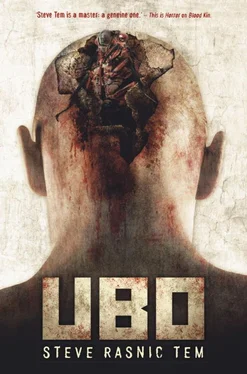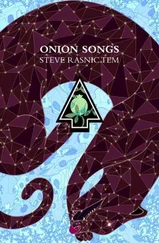“But all that exertion and I didn’t break the cyanide capsule in my mouth, until then. I was very pleased to have obtained such a poison. A splendid detail. Very international spy and all that. But I slipped and twisted my arm, popping my shoulder out of its socket. I inadvertently bit down on the capsule. I was in so much pain, you see. Not just physically, but I was cursing the world and everything in it, how existence itself had betrayed me.” He stopped and once again smiled at Daniel with that dreamy, almost unworldly smile.
Daniel stared at him. It had begun to rain, and the drops blown in through the window were softly beating the side of his face. The sensation was soothing, so he didn’t move. He had a vague notion that the sounds of the waves against the foundations below were even louder, and there was a kind of churning noise under it all. “Wait. When did the roaches come into this?”
“I first saw the roaches when I woke up here. In Ubo.”
“I mean before that. What’s the last thing you remember in your old life?”
“I told you. That terrible pain, and then the raging. And I must have fallen unconscious, because I had that dream about the roaches we’ve all had.”
“Well, no, I don’t think that’s a dream,” Daniel said. “As far as I know that’s a memory, however unreliable, of how we were kidnapped, how we were physically carried away.”
“Yes, and then the next thing I woke up in Ubo.”
“But that makes no sense.”
“I’m sorry, but that’s the way it happened.”
“But how did they retrieve you? How did the roaches get to your body before you would have died? The rest of us, everyone I’ve talked to, we were taken from our beds, or out in the street, after we’d done something, or thought of something. The trigger seems to be different for everybody. They snatched us. How could they snatch you, deep inside a concrete form, trapped inside a cage of iron bars, and presumably seconds away from death by cyanide?”
Gandhi blinked, looking stricken. Then he began to weep.
“I knew it!” he cried. “None of it makes any sense! I really must be in Hell!”

14
IT WAS JUST past dawn when they arrived back at the barracks. Falstaff grabbed him by the shoulder and pointed at Gandhi. “What’s wrong with him? He’s almost catatonic.”
Daniel trusted Falstaff even less than before. “We’re all exhausted,” he said. “And him more than the rest of us, I think. All that drama with Henry, it really upset him.”
Falstaff nodded and let go. Daniel crawled under the blanket on his bunk. He’d hardly shut his eyes when the roaches invaded the barracks. He woke up to giant insect parts on his face, black mandibles hovering only an inch or two above his eyes. Huge roach legs churned eagerly, leg hairs the size of drinking straws snagging his blanket and tearing it off the bunk. He panicked, raising his fists to knock them away. Something sharp pinned his arms and his vision went slightly blurred. He was jerked to his feet. All around him the roaches were pulling residents from their bunks and herding them out of the room.
The roaches seemed more numerous than they had the past several weeks, but still there were far fewer of them than when he’d first arrived. They were agitated, antennae waving and wiry legs scrabbling over the broken tiles as they shoved and carried the residents rapidly back into the labs.
Daniel was in the corridor now, several roaches surrounding him. Normally he would have been in the waiting room and they would have come for him, and then there would be this gradual loss of consciousness as he was taken into the labs where they induced the scenarios. Although he wasn’t aware of them giving him anything he’d steadily fall toward sleep until he was almost unconscious by the time they reached the final door. As they pushed him through the door it would feel as if they’d just pushed him out of an airplane without a parachute, his face exploding with light and air, his eyes registering no more than a vague impression of the room itself: shiny metal and glass, fragments of mirror and a distant babble of musical voices. But this time he was fully aware when they hit the lab’s double doors. Had they simply forgotten to do what they had always done before, or was there a problem with the drugs they normally used?
He was fully into the room and they were hurriedly strapping him onto a flat surface suspended within a mountain of spiraling glass, great crystalline stalagmites piercing a shadowy net of webbing and blinking nodes, claws and, if he wasn’t mistaken, human hands making a blur of tunings about him, adjusting something around his skull, tubes the size and shape of prescription bottles attached and humming on his head, then something slipping into his mouth, pinpricks along his breastbone and underneath it all a layering of near and far voices in English and French and German and languages he did not recognize, weeping and angrily spitting out their complaints and ecstasies, their life stories uncleansed and uncensored.
Suddenly there was a rapid blinking. The brilliance collapsed into a complete blackness, as if they’d been swallowed up by the earth, and then there was a hum and everything lit up again. The voices around him were frantic, unintelligible. Then the smell of something burning, a whine, and again a profound darkness. A chitter of voices in the night, the sounds of a frenetic exodus, or was it an invasion? They jostled him, but he couldn’t tell if he was being moved. A weight on his chest and then the room blazed again painfully, as if his eyes were on fire. Shouted commands and fast-moving hands.
With a slap to his head he was gone then, and came out of it swallowed up inside the core of someone else’s life, so deeply embedded he could not detect the sound of his own thoughts, as if he were all receiver with no ability to transmit at all.
The God of Mayhem woke to a new kind of stench. It happened all the time now, and for no reason that he could tell. He stepped outside to see if anything had changed since the day before. The world was an unpredictable place. He sniffed the air. The world was a foul place.
Fires burned in the neighborhood, and fires still burned in the old suburbs stretching far behind him. Some of those were his fires, and some were fires set by others. Some of the fires had a practical purpose. Maybe somebody tried to clean up the trash that lay everywhere. Maybe somebody tried to burn the body of someone they loved who had just died. Murder was everywhere. Burning was the decent thing, with no decent place to bury.
Some were for worship—there were a thousand gods and Mayhem was just one of them. And some were probably just for fun. An explosion went off in his head. He wanted to run as far as he could, run right out of this trash heap city.
Barbed, narrow legs played with his thoughts, hard shell and claw and bodies torn and leaking.
The human rats who worked through the trash every day were always uncovering new stink, a constant clatter and rattle of noise as they picked and traded. He could hear the wild dog packs howling on the other side of that collapsed row of houses, and it was all he could do not to howl back. Sometimes the sourness went so deep he could feel it in his lungs.
They’d made the world a terrible place, God damn them, his moms and his pops and all the ones that came before. The air was full of black bits and all the little kiddies were dying. Even the drinking water stank.
The early morning sky blazed red with the sun peeking through a curtain of black boiling clouds. Down below a paler smoke wrapped the buildings and wandered lost as a ghost through the alleys and streets. Roofs and ceilings fell into wavy stacks with trees growing through. Out front was a bus half-filled with dirt. A churn of filth decorated the rooftops. A fuzzy green border hung from the eaves. Beyond the broken backs of roofs and a scatter of walls was one edge of the flooded and foul Boston Harbor. Three tanker ships sat low in the water on the near side, slowly leaking their dark shadows to wander the harbor. He’d had a notion to set those ships on fire, but didn’t like starting a fire he knew he could not control.
Читать дальше













